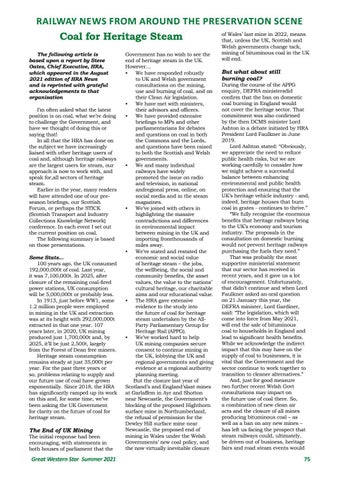RAILWAY NEWS FROM AROUND THE PRESERVATION SCENE of Wales’ last mine in 2022, means Coal for Heritage Steam that, unless the UK, Scottish and The following article is based upon a report by Steve Oates, Chief Executive, HRA, which appeared in the August 2021 edition of HRA News and is reprinted with grateful acknowledgements to that organisation I’m often asked what the latest position is on coal, what we’re doing to challenge the Government, and have we thought of doing this or saying that! In all that the HRA has done on the subject we have increasingly liaised with other heritage users of coal and, although heritage railways are the largest users for steam, our approach is now to work with, and speak for,all sectors of heritage steam. Earlier in the year, many readers will have attended one of our preseason briefings, our Scottish Forum, or perhaps the STICK (Scottish Transport and Industry Collections Knowledge Network) conference. In each event I set out the current position on coal. The following summary is based on those presentations. Some Stats... 100 years ago, the UK consumed 192,000,000t of coal. Last year, it was 7,100,000t. In 2025, after closure of the remaining coal-fired power stations, UK consumption will be 5,000,000t or probably less. In 1913, just before WW1, some 1.2 million people were employed in mining in the UK and extraction was at its height with 292,000,000t extracted in that one year. 107 years later, in 2020, UK mining produced just 1,700,000t and, by 2025, it’ll be just 2,500t, largely from the Forest of Dean free miners. Heritage steam consumption remains steady at just 35,000t per year. For the past three years or so, problems relating to supply and our future use of coal have grown exponentially. Since 2018, the HRA has significantly ramped up its work on this and, for some time, we’ve been asking the UK Government for clarity on the future of coal for heritage steam.
The End of UK Mining
The initial response had been encouraging, with statements in both houses of parliament that the
Great Western Star Summer 2021
Government has no wish to see the end of heritage steam in the UK. However… • We have responded robustly to UK and Welsh government consultations on the mining, use and burning of coal, and on their Clean Air legislation. • We have met with ministers, their advisors and officers. • We have provided extensive briefings to MPs and other parliamentarians for debates and questions on coal in both the Commons and the Lords, and questions have been raised to both the Scottish and Welsh governments. • We and many individual railways have widely promoted the issue on radio and television, in national andregional press, online, on social media and in the steam magazines. • We’ve joined with others in highlighting the massive contradictions and differences in environmental impact between mining in the UK and importing fromthousands of miles away. • We’ve stated and restated the economic and social value of heritage steam – the jobs, the wellbeing, the social and community benefits, the asset values, the value to the nations’ cultural heritage, our charitable aims and our educational value. • The HRA gave extensive evidence to the study into the future of coal for heritage steam undertaken by the AllParty Parliamentary Group for Heritage Rail (APPG). • We’ve worked hard to help UK mining companies secure consent to continue mining in the UK, lobbying the UK and regional governments and giving evidence at a regional authority planning meeting. But the closure last year of Scotland’s and England’slast mines at Garlaffem in Ayr and Shotton near Newcastle, the Government’s blocking of the proposed Highthorn surface mine in Northumberland, the refusal of permission for the Dewley Hill surface mine near Newcastle, the proposed end of mining in Wales under the Welsh Governments’ new coal policy, and the now virtually inevitable closure
Welsh governments change tack, mining of bituminous coal in the UK will end.
But what about still burning coal?
During the course of the APPG enquiry, DEFRA ministersdid confirm that the ban on domestic coal burning in England would not cover the heritage sector. That commitment was also confirmed by the then DCMS minister Lord Ashton in a debate initiated by HRA President Lord Faulkner in June 2019. Lord Ashton stated: “Obviously, we appreciate the need to reduce public health risks, but we are working carefully to consider how we might achieve a successful balance between enhancing environmental and public health protection and ensuring that the UK’s heritage vehicle industry - and, indeed, heritage houses that burn coal in grates - continues to thrive.” “We fully recognise the enormous benefits that heritage railways bring to the UK’s economy and tourism industry. The proposals in the consultation on domestic burning would not prevent heritage railways purchasing the fuels they need.” That was probably the most supportive ministerial statement that our sector has received in recent years, and it gave us a lot of encouragement. Unfortunately, that didn’t continue and when Lord Faulkner asked an oral question on 21 January this year, the DEFRA minister, Lord Gardiner, said: “The legislation, which will come into force from May 2021, will end the sale of bituminous coal to households in England and lead to significant health benefits. While we acknowledge the indirect impact that this may have on the supply of coal to businesses, it is vital that the Government and the sector continue to work together to transition to cleaner alternatives.” And, just for good measure two further recent Welsh Govt consultations may impact on the future use of coal there. So, a combination of new clean air acts and the closure of all mines producing bituminous coal – as well as a ban on any new mines – has left us facing the prospect that steam railways could, ultimately, be driven out of business, heritage fairs and road steam events would
75



























